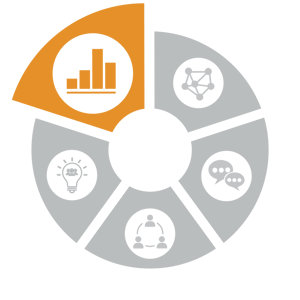 Evaluating impact
Evaluating impact
Over the last twenty years people interested in building strong communities have been making an important shift. Eager to “move the needle” on our quality of life issues, they are experimenting with new ways to create mutually reinforcing community-wide strategies that yield big changes as opposed to hoping that the individual efforts of organizations and services end up being more than the sum of their parts.
This new approach to community change requires a different way to evaluate.
Evaluating impact Workshops
Monday, September 30 | Participatory Evaluation
Gone (mostly) are the days when the evaluator was the expert and stakeholders anxiously awaited their feedback and judgement. In today’s world, initiative stakeholders can play a key role in every step of the evaluation, from establishing questions to making sense of results. This is particularly true in complex contexts where stakeholders have very different - even conflicting – values, interests and power and everyone’s perspective and voice is required in order to meaningfully move forward
Session Goals:
- Examine the different types of participatory evaluation
- Review the steps and stages when an evaluation can be participatory
- Explore exemplar participatory methods and where to go for more
- Critically reflect on which participatory approach might work best for you
- Use an evaluation checklist and reflection sheet to help transfer your learning back into your work, the work of your organization and/or community
Tuesday, October 1 | Innovative Practices in Participatory Evaluation
If we are serious about embracing a participatory approach to evaluation, we should be aware of some of the newest ways to go about it. This skills session will explore up to five of the most innovative paradigms and methods in the field and create an opportunity for you to discuss and reflect on their relevance for your work.
Session Goals:
- Explore new participatory methods – including but not limited to critical system heuristics, gender-responsive evaluation, Indigenous evaluation and evaluation rubrics
- Examine how drawing from these methodologies can make your evaluation(s) more meaningful
- Critically reflect on which methodologies are best suited to your needs, and the needs of the community
- Use an Evaluation Planning Canvas to help transfer your learning back into your work, the work of your organization and/or community
Wednesday, October 2 | Innovative Practices in Participatory Evaluation
Building on the past two days the third workshop day will focus on appropriating evaluation theory to the practicalities of community change work. To what extent can theoretical models be applied in practice to help us track continuous improvement of innovative community initiatives?
We will do this by looking at examples on how to evaluate using 90 day campaigns, prototypes, shared measurements, app development, lessons learned and sense making from the data and evaluation. We will look at the practicalities of how to work side by side with evaluators, front line workers, and the work of your organization and with those trying to make long term change within their communities. Finally we will look at how to effectively leverage evaluation as a tool for advocacy and communication for funders, decision makers and stakeholders to ensure long term community change.
Session Goals:
- Explore how to make evaluation work for your organization and community
- Reflect and asses on how to make your work more meaningful and have impact
- How to transfer you learning back into your work, your organization and community
Meet pamela, your festival faculty member
Pamela Teitelbaum
Consulting Director, Evaluating Impact
Tamarack Learning Centre
Pamela is a Consulting Director of the Tamarack Institute’s Evaluating Impact Practice Area. She is passionate about supporting and facilitating an interplay of learning and evaluation that creates transformative experiences aimed at developing healthy, equitable, gender-responsive and rights-based communities. Pamela believes that increasing access and awareness about evaluation strategies, methodologies and processes leads to more critical, collaborative and long-term community change.
By increasing the capacity of communities to engage in and employ strategically-designed evaluation and learning practices, more possibilities are created for stakeholders and beneficiaries to experience the value of community changes and how they lead to effective, efficient and impactful outcomes. In 2010, Pamela founded a consulting company specializing in evaluating and supporting capacity building, educational design, training, monitoring and evaluation, social policy research and community engagement. With over 20 years of experience designing and facilitating training, leading social policy research and evaluation processes, she has worked extensively within the international and Canadian NGO sector in the fields of international human rights education, gender equality, and community development.
